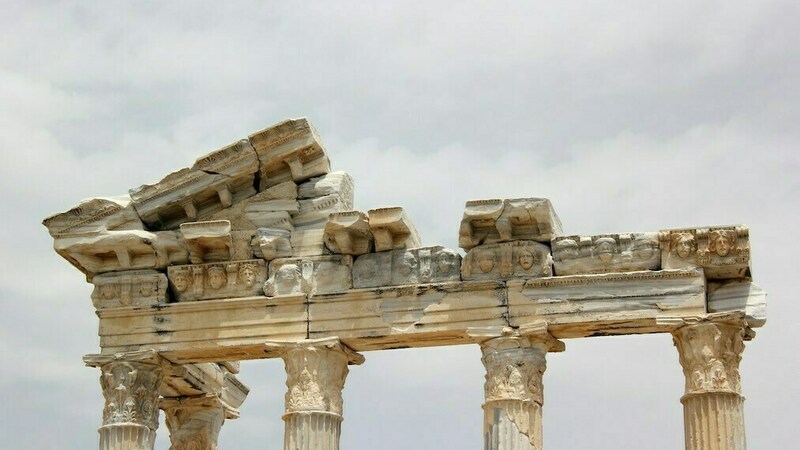Alice Oswald’s poem Memorial takes its audience on a metaphorical journey down to the underworld to learn the fates of long-forgotten heroes. As you walk past the wandering shades of warriors lost in the heat of battle, you learn the ancient names that they bore and the wretched tragedies that befell them. You realize that after war fades from memory and old grudges die to time, all that is left behind is grief. In its interpretive translation of Homer’s epic poem, the Iliad, Oswald’s Memorial solemnly reminds its audience that the men whose lives paid off the vicious blood-debt of war were truly human. Unlike the Iliad, Oswald’s poem contains no plot, no mention of Achilles’ rage, and no notion of immortal glory. Akin to the countless lives cut short in the Trojan War, Oswald’s poem does not progress. Memorial is a stagnant, dirge-like meditation on death that recalls the names of each warrior slain in the Iliad. Conjuring vivid images of loss, Oswald intersperses her poem’s obituaries with repetitions of chilling epic similes. Memorial’s already piercing effect becomes even more poignant when read alongside its source material. While staying true to the Iliad’s original language, Oswald’s omissions, preservations, and syntactical choices give a new focus to Homer’s epic poem. Oswald’s portrayal of the death of Adrestus (Mem. p. 25), an obscure Trojan warrior, is a highly representative example of how Memorial employs these techniques in conjunction. As evidenced by the poet’s emphasis on Adrestus’ individual loss rather than Homer’s epic narrative, Alice Oswald’s Memorial recontextualizes the Iliad’s tragic deaths to portray war as senseless slaughter rather than a means of obtaining immortal glory.
In the Iliad, Adrestus’ tragic death is only briefly mentioned when he is killed in battle by Menelaus and Agamemnon (Il. 6.43-77). He is merely one of many unfortunate Trojans who fall victim to a successful Achaean advance. As warriors around him trade lives for glory, Adrestus’ horses entangle themselves in the branches of a tree, flinging him from his chariot and into the fateful clutches of Menelaus, an enemy warrior. A panicked Adrestus supplicates for his life, offering his father’s riches as ransom. These words begin to sway Menelaus, who almost takes him as prisoner before Agamemnon, his brother, chastises his softness. After Agamemnon convinces Menelaus to show no mercy to their Trojan foes, Menelaus shoves Adrestus back and Agamemnon spears his flank, ending the warrior’s life on the spot. As Homer’s poem primarily concerns itself with “the rage of Peleus’ son Achilles” (Il. 1.1), individual losses on the battlefield are often overshadowed by larger narrative events, such as the standoff between Achilles and Agamemnon, the Trojans’ burning of the Greek ships, and the interventions of the gods. While Menelaus and Agamemnon continue to shape the major events of the poem, Adrestus is quickly forgotten in the narrative after his demise. Consequently, Adrestus’ death feels insignificant in the grand scheme of Homer’s epic poem.
In her version of the death of Adrestus, Oswald highlights the warrior’s gruesome end by making the victim’s name the focus of the stanza. She begins her description of his doom by noting that “ADRESTUS almost survived” at the hands of Menelaus and Agamemnon, who are collectively referred to as the Atreidae (Mem. p. 25). By deliberately capitalizing each letter in the victim’s name, Oswald dedicates the entire stanza to Adrestus. Oswald goes on to describe the terrible sound of Adrestus’ ensared horses, who kick and struggle as Adrestus helplessly falls to the feet of Menelaus. Adrestus offers his father’s treasures in exchange for his life before Agamemnon calls Menelaus weak and wishes death upon the entire Trojan race. Making no reference to Menelaus’ thoughts nor the manner of the Trojan’s doom, Oswald abruptly declares the death of Adrestus. The emphasis placed on Adrestus’ loss reminds the reader to reflect on the fear and desperation that gripped him in his last moments instead of the broader conflict that led to his unfortunate demise. This humanizing effect is present throughout Memorial, as Oswald capitalizes the first mention of every victim’s name in their respective stanzas. In a way, each stanza functions as a tombstone inscription that encourages the audience to pause for each warrior, read each name, and mourn each loss. Oswald leaves behind a poetic graveyard where one can experience the immeasurable toll of war.
Along with its use of capitalization, Memorial’s syntactical choices afford greater weight to Adrestus’ doom and diminish the importance of immortal glory sought by the victors in battle. Oswald derives her line “ADRESTUS almost survived” (Mem. p. 25) from the Iliad’s original text, which states that “Menelaus / lord of the war cry had caught Adrestus alive” (Il. 6.43-44). Additionally, Oswald adapts the nondescript line, “that was the death of Adrestus,” (Mem. p. 25) from Homer, who more explicitly states that “Menelaus shoved Adrestus back” while “Agamemnon stabbed him in the flank” (Il. 6.73-74). A side-by-side comparison of Oswald and Homer’s language highlights an important disparity in syntax between the two works. Whereas the Atreidae are the grammatical subjects of Homer’s sentences, “the death of Adrestus” is Oswald’s primary subject. Oswald’s syntax emphasizes the impact of Adrestus’ sudden loss of life and ignores any glory that the Atreidae may earn in combat. This effectively reminds the audience to meditate on the enormous cost of human conflict rather than any perceived good in war.
In contrast to Memorial’s focus on Adrestus and his fate, the Iliad asserts the value of kleos, or immortal glory, as a means of legitimizing war by making the victorious Atreidae the focus of its narrative. In particular, Homer frames Adrestus’ loss of life as a natural and just consequence of the Atreidae’s vengeful campaign against the Trojans. Immediately after Agamemnon disparages his brother for his merciful inclinations, Homer describes Agamemnon’s act of bringing “his brother round” to finish off Adrestus as “rough justice, fitting too” (Il. 6.71-72). Through his approval of Agamemnon’s actions, Homer presents the exchange of life for kleos as a harsh but necessary tradeoff. This idea is integral to the Iliad’s narrative, as Achilles, the poem’s central character, espouses the same ideology. Doomed to choose between a short but glorious life of combat and a long but anonymous life of safety, Achilles believes that he must immortalize his name in combat to give his life value (Il. 9.499-505). Thus, Homer’s epic poem suggests that glory makes war worthwhile by portraying it as something that allows a warrior’s fame to live long after they are slain in battle. Ultimately, the Iliad treats Adrestus’ death as an event that concerns the Atreidae and their accumulation of glory in combat.
Although Homer affords greater attention to glory in the grand scheme of war, both Homer and Oswald acknowledge the tragedy of Adrestus’ death. Memorial’s tragic embellishments of Adrestus’ last moments are not Oswald’s inventions. Rather, it was Homer who first captured Adrestus’ horror and desperation. Homer describes Adrestus’ horses as “rearing, bolting in terror” and the warrior himself “pleading” as Menelaus looms over him (Il. 6.45-46,53). Memorial employs the same essential language in describing how “it was horrible to hear the hoof-kicking struggle of” Adrestus’ horses and how he begged for his life in his last moments (Mem. p. 25). It is incredibly important to note that Memorial’s biographies are based on the retellings of Homer, who already went to the effort of naming each warrior slain in battle and depicting their terrible deaths. This suggests that both the Iliad and Memorial consider the cost of war, as both works aim to honor even the most obscure warriors lost in battle.
While it is an excellent example of how Memorial isolates a warrior’s doom from the Iliad’s broader narrative, Oswald’s adaptation of Adrestus’ fate notably deviates from other entries in her poem in that it gives a voice to those who kill. Oswald takes special care to preserve Agamemnon’s callous speech to Menelaus (Il. 6.63-70) in her version of the Iliad. Before they end his life, Agamemnon urges the hesitant Menelaus to finish off Adrestus and abandon all sympathy for the Trojans, wishing “a death-curse on all of them” (Mem. p. 25). Suggesting the ruthless slaughter of “even the unborn ones in their mothers’ bellies,” Agamemnon further expresses his hateful wish that his foes “be uncried for” and left “unburied” (Mem. p. 25). This speech provides powerful insight into the cruelty that consumes those who seek glory in war. Having omitted the kleos that the Atreidae seek in combat, Memorial suggests that the only significant product of Agamemnon’s hatred is Adrestus’ needless demise. This makes Agamemnon’s wish to butcher his enemies seem arbitrary and barbaric. Even so, it is apparent that Adrestus’ death cannot satisfy Agamemnon’s insatiable bloodlust because he still seeks to wipe out the entire race of Trojans. Memorial demonstrates that Agamemnon is a mouthpiece for war itself, as both demand the fruitless sacrifice of human life but remain unappeased. In the end, Oswald’s inclusion of Agamemnon’s speech portrays war as something that begets nothing but death.
Overall, the death of Adrestus serves as a powerful example of how Oswald adapts from the Iliad’s epic narrative to emphasize the horrific loss that accompanies human strife. Listing the names and fates of the hundreds slain in Homer’s epic poem, Oswald reminds the audience that each warrior had a life, a family, and a unique story to tell before they were cut off by indiscriminate slaughter. The omission of the Iliad’s epic narrative is a major component of what sets Memorial apart from its source material, as Oswald discards the flashy exploits of glory-driven heroes that distract from the raw carnage they leave behind. In doing so, Oswald cuts away from the Iliad until nothing but the tragic graveyard of Memorial remains. Nevertheless, Oswald’s interpretation of Homer’s work does not attempt to change the meaning of the Iliad or even discredit kleos. Rather, Memorial seeks to magnify the horrors first depicted by Homer. Oswald accomplishes this by isolating each death from its original narrative context, resulting in a presentation of war that is devoid of glory. Putting into perspective what mankind has to lose when nations take up arms, Memorial’s sorrowful meditation on the Trojan War’s aftermath demonstrates that no amount of glory, riches, or victory in battle can fill the void of human loss.
Works Cited
Homer. The Iliad. Translated by Robert Fagles, Penguin, 1991.
Oswald, Alice. Memorial: A Version of Homer’s Iliad. W. W. Norton and Co., 2013.

